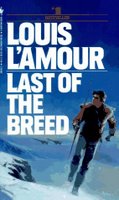The only book I have ever read by Louis L'Amour, and it's not a western. In the height of the cold war, an Air Force test pilot is captured by the Russians; their intent is to question him about the latest American technologies he has tested. What they don't know is that Major Joe Makatozi (aka "Joe Mack") is not only a resourceful officer and a decathlete, but also part Sioux Indian; he was raised learning how to hunt and live off the land, like his people used to do. Joe quickly escapes the isolated Siberian prison and makes his way across Siberia, surviving the winter and the harsh conditions, following the ancient path his ancestors took over the Bering Strait to the Americas.
This book isn't technically a Western-- it's a fairly contemporary, Cold War-era novel that is quite a fun adventure. But in some ways, it feels like my impression of Westerns (not a genre I'm so familiar with). For instance, the good guys and bad guys are very clear cut (although there are plenty of good Russian and Lithuanian characters); Joe's one main concern is the tracker Alekhin, a Yakhut (native Siberian, similar to our American Indians) who is famous for his skill, but also for his cruelty. At one point during the winter, Joe Mack finds a group of dissidents who scrape out an rough existence, trapping for furs to make some money and bribe officials to leave them alone. Joe lives near them for a while, and even connects with a beautiful woman.
Joe Mack is a larger-than-life character: an officer in the Air Force and a nearly olympic-class decathlete, but also an Indian who knows how to make his own bow and arrows, how to trap and hunt animals, treat the furs and leather, and even make his own moccasins. He knows how to travel quickly, leaving very few signs for trackers, and is even clever enough to leave traps behind him for the unwary men following him. At various points in the book, he takes down a bear and even three men in a helicopter with just his bow & arrows. The story seems a little far-fetched, but I also know that there are extraordinary men who can do amazing things (reading the one-page author bio was a reminder that there are men who seem able to do almost anything well).
The title rings true with Joe's sense that his education and civilized demeanor is really just a veneer, and that at heart he is a true "savage" like his ancestors-- in his ability to survive extreme conditions, but also in his identity as a warrior who takes a personal affront to being captured by the Russians. Joe Mack's capability to be savage is brought home in the masterful way the book ends-- L'Amour tells us just enough so that we know how the story ends and gives us some idea of what Joe Mack might do later on.
| Title: | Last of the Breed |
|---|---|
| Author: | Louis L'Amour |
| Date published: | 1986 |
| Genre: | Adventure |
| Number of pages: | 368 |
| Notes: | Second reading |



0 comments:
Post a Comment